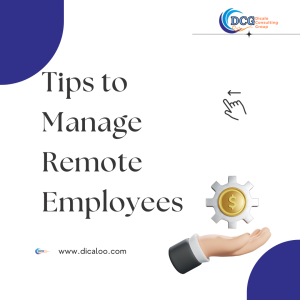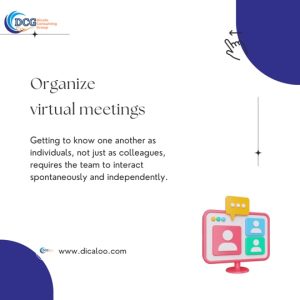Effective Remote Work Management: Tips and Best Practices

Remote work has become a staple in the modern workplace, offering flexibility and freedom that was once unimaginable. However, the shift from traditional office settings to remote work environments comes with its own set of challenges. As organisations continue to adapt to this new norm, it’s crucial to establish effective strategies to manage remote teams. At Dicalo Consulting Group, we’ve identified four essential tips to ensure that remote work remains productive and efficient: clear communication, ensuring everyone is onboard, organising virtual meetings, and maintaining personal communication.
1. Prioritise Clear and Consistent Communication
Effective communication is the bedrock of any successful remote work strategy. In a traditional office setting, spontaneous interactions and face-to-face conversations facilitate the exchange of information. However, in a remote environment, these interactions are less frequent, which can lead to misunderstandings and delays if communication isn’t handled properly.
To bridge the gap, it’s vital to establish clear and consistent communication channels. Encourage team members to communicate openly and frequently, whether through emails, chat platforms like Slack, or video conferencing tools like Zoom. It’s also helpful to set guidelines on how different communication tools should be used. For instance, urgent matters might require a quick phone call or a direct message, while less pressing issues can be discussed via email or during scheduled meetings.
Additionally, it’s important to promote a culture of over-communication. Since remote work can create a sense of isolation, team members should be encouraged to share updates on their progress regularly. This not only keeps everyone informed but also helps to maintain a sense of team cohesion.

2. Ensure Everyone is Onboard
For remote work to be truly effective, everyone on the team needs to be fully onboard with the process. This means that all team members should have the necessary tools, resources, and training to perform their tasks efficiently from a remote location.
Start by ensuring that everyone has access to reliable technology. This includes not only the hardware, such as laptops and internet connections but also the software needed to collaborate effectively. Tools like project management software, file-sharing platforms, and communication apps are essential for keeping remote teams synchronised.
Beyond the technical aspects, it’s crucial to provide proper training on how to use these tools effectively. This includes both technical training and guidance on best practices for remote work. Regular check-ins can help identify any gaps in knowledge or resources, allowing managers to address issues before they become obstacles.
Equally important is fostering a remote work culture that values trust, accountability, and flexibility. Remote work can be challenging for those who are accustomed to the structure of an office environment. By setting clear expectations and providing support, managers can help ease the transition and ensure that everyone is committed to the remote work model.

3. Organise Regular Virtual Meetings
While remote work offers flexibility, it can also lead to feelings of disconnection if not managed properly. Virtual meetings are an effective way to keep teams connected and aligned with the company’s goals. However, it’s important to strike a balance—too many meetings can be overwhelming, while too few can lead to disengagement.
Regular virtual meetings should be scheduled to discuss project updates, share important information, and provide a platform for team members to voice their concerns or ideas. These meetings can be structured in various formats, such as daily stand-ups, weekly check-ins, or monthly team reviews, depending on the needs of the team.
When organising virtual meetings, it’s crucial to be mindful of time zones, especially if your team is distributed globally. Scheduling meetings at a time that works for everyone can be challenging, but it’s important to find a balance that allows all team members to participate without inconvenience.
In addition to formal meetings, consider incorporating more casual, team-building virtual events. These could be virtual coffee breaks, online game sessions, or informal chats that allow team members to connect on a personal level. This helps to maintain a sense of camaraderie and team spirit, which is often lost in remote work environments.

4. Maintain Personal Communication
In a remote work setting, the importance of personal communication cannot be overstated. While virtual meetings and formal communication channels are essential for keeping work on track, personal communication helps to maintain the human connection that is often missing in remote work.
Encourage managers to check in with their team members individually on a regular basis. These check-ins should not only focus on work-related issues but also on the well-being of the employee. Remote work can sometimes feel isolating, and personal communication helps to ensure that employees feel supported and valued.
Personal communication also involves recognising and celebrating individual and team achievements. Whether it’s a shoutout during a meeting or a personal note of appreciation, acknowledging hard work and success goes a long way in maintaining morale and motivation in a remote environment.
Moreover, creating opportunities for team members to interact on a personal level, even in a virtual setting, is vital. This could be through social channels on communication platforms, where employees can share personal milestones, hobbies, or interests. Such interactions foster a sense of community and help to strengthen relationships within the team.

Conclusion
Managing remote work effectively requires a thoughtful approach that prioritises communication, ensures everyone is equipped and onboard, organises regular virtual meetings, and maintains personal connections. By implementing these strategies, organisations can not only overcome the challenges of remote work but also unlock its full potential.
At Dicalo Consulting Group, we believe that the key to successful remote work lies in the balance between structure and flexibility, and the commitment to fostering a supportive and connected remote work culture. With these tips, your organisation can thrive in the ever-evolving landscape of remote work.

